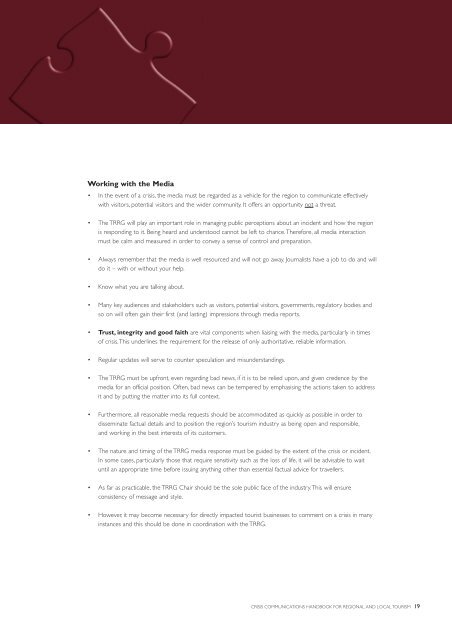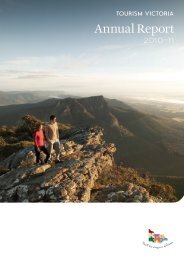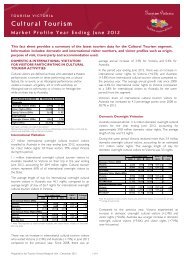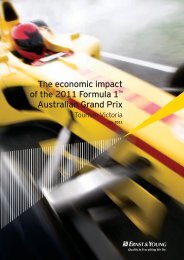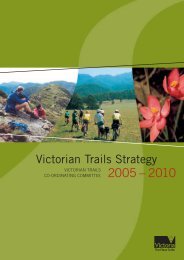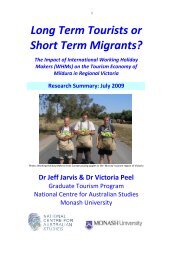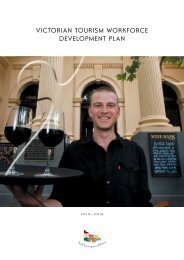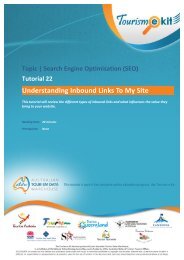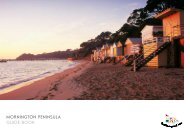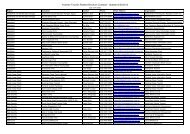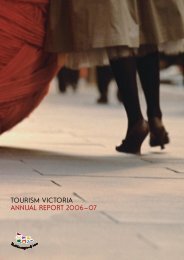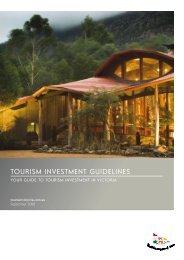Crisis Communications Handbook for Regional ... - Tourism Victoria
Crisis Communications Handbook for Regional ... - Tourism Victoria
Crisis Communications Handbook for Regional ... - Tourism Victoria
You also want an ePaper? Increase the reach of your titles
YUMPU automatically turns print PDFs into web optimized ePapers that Google loves.
Working with the Media<br />
• In the event of a crisis, the media must be regarded as a vehicle <strong>for</strong> the region to communicate effectively<br />
with visitors, potential visitors and the wider community. It offers an opportunity not a threat.<br />
• The TRRG will play an important role in managing public perceptions about an incident and how the region<br />
is responding to it. Being heard and understood cannot be left to chance.There<strong>for</strong>e, all media interaction<br />
must be calm and measured in order to convey a sense of control and preparation.<br />
• Always remember that the media is well resourced and will not go away. Journalists have a job to do and will<br />
do it – with or without your help.<br />
• Know what you are talking about.<br />
• Many key audiences and stakeholders such as visitors, potential visitors, governments, regulatory bodies and<br />
so on will often gain their first (and lasting) impressions through media reports.<br />
• Trust, integrity and good faith are vital components when liaising with the media, particularly in times<br />
of crisis.This underlines the requirement <strong>for</strong> the release of only authoritative, reliable in<strong>for</strong>mation.<br />
• Regular updates will serve to counter speculation and misunderstandings.<br />
• The TRRG must be upfront, even regarding bad news, if it is to be relied upon, and given credence by the<br />
media <strong>for</strong> an official position. Often, bad news can be tempered by emphasising the actions taken to address<br />
it and by putting the matter into its full context.<br />
• Furthermore, all reasonable media requests should be accommodated as quickly as possible in order to<br />
disseminate factual details and to position the region’s tourism industry as being open and responsible,<br />
and working in the best interests of its customers.<br />
• The nature and timing of the TRRG media response must be guided by the extent of the crisis or incident.<br />
In some cases, particularly those that require sensitivity such as the loss of life, it will be advisable to wait<br />
until an appropriate time be<strong>for</strong>e issuing anything other than essential factual advice <strong>for</strong> travellers.<br />
• As far as practicable, the TRRG Chair should be the sole public face of the industry.This will ensure<br />
consistency of message and style.<br />
• However, it may become necessary <strong>for</strong> directly impacted tourist businesses to comment on a crisis in many<br />
instances and this should be done in coordination with the TRRG.<br />
CRISIS COMMUNICATIONS HANDBOOK FOR REGIONAL AND LOCAL TOURISM 19


